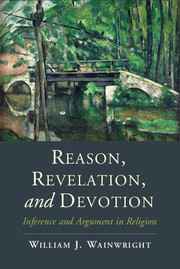Book contents
- Frontmatter
- Dedication
- Contents
- Acknowledgments
- Introduction
- 1 Four Examples of Religious Reasoning
- 2 The Purposes of Argument and the Person-Relativity of Proofs
- 3 Religious Reading and Theological Argument
- 4 Passional Reasoning
- 5 The Role of Rhetoric in Religious Argumentation
- 6 Reason, Revelation, and Religious Argumentation
- 7 Theology and Mystery
- Conclusion
- Notes
- Index
1 - Four Examples of Religious Reasoning
Published online by Cambridge University Press: 05 December 2015
- Frontmatter
- Dedication
- Contents
- Acknowledgments
- Introduction
- 1 Four Examples of Religious Reasoning
- 2 The Purposes of Argument and the Person-Relativity of Proofs
- 3 Religious Reading and Theological Argument
- 4 Passional Reasoning
- 5 The Role of Rhetoric in Religious Argumentation
- 6 Reason, Revelation, and Religious Argumentation
- 7 Theology and Mystery
- Conclusion
- Notes
- Index
Summary
This chapter examines an influential proof of God's existence, attempts to defend the coherence of the concept of omnipotence, arguments for and against the personhood of ultimate reality, and competing accounts of the relative importance of grace and free will. While this chapter will bring out the strengths and weaknesses of the arguments it examines, its primary purpose is to provide the reader with historically important instances of religious reasoning which he or she can refer to when reading later chapters.
Samuel Clarke's Cosmological Argument for the Existence of God
Proceeding from the assumption that anything that exists must have a sufficient reason for its existence, Samuel Clarke (1675–1729) argued that the existence of contingent beings can only be explained by postulating the existence of a self-existent being, that is, a being that is both essentially causeless and self-explanatory or intrinsically intelligible (although not necessarily intelligible to us). If a being is self-existent, however, it is also logically necessary.
We can formulate Clarke's argument as follows:
1. If something exists, it is either self-existent (and hence self-explanatory) or some other being causes it to exist.
2. A contingent being isn't self-existent. Therefore,
3. A contingent being is caused to exist by some other being. (From 1 and 2.)
Contingent beings are usually caused by other contingent beings. Samuel Clarke's existence, for example, was caused by his parents, their existence was caused by their parents, and so on. Yet what about contingent beings as a whole?
4. Either the series of contingent beings has a first member (a contingent being that isn't caused by another contingent being) or it doesn't (the series is beginningless).
5. If the series has a first member, then a self-existent being exists and causes it. (From 3. Since the first member is contingent, another being causes it. By hypothesis, the first member isn't caused by a contingent being. Hence, it is caused by a self-existent being.)
6. If the series of contingent beings doesn't have a first member (and is therefore beginningless), a self-existent being exists and causes the whole series. (From 3. Since the existence of the series is contingent, another being causes it.
Since the cause of the series of contingent beings isn't part of the series, it isn't itself contingent.)
7. If contingent beings exist, a self-existent being exists and causes them. (From 4, 5, and 6.)
- Type
- Chapter
- Information
- Reason, Revelation, and DevotionInference and Argument in Religion, pp. 5 - 31Publisher: Cambridge University PressPrint publication year: 2015

